Last week, out of some lack of inspiration, I posted my blog about the importance of loving communication with your dog. What I didn't expect was that there would be many comments on this blog. It seriously surprised me. Lately, I've been seeing much less interaction on Hive on average lately, and that's sapping my motivation, in addition to the fact that my life can best be described as a life in lockdown. This often provides little inspiration for blogging. So an easy point to fall back on was my love for dogs. And from there the idea came to blog about loving communication with your dog. In the previous blog, I already said I have made every conceivable mistake. And some of the mistakes I made were partly due to my assumption that a dog trainer would know better than me.
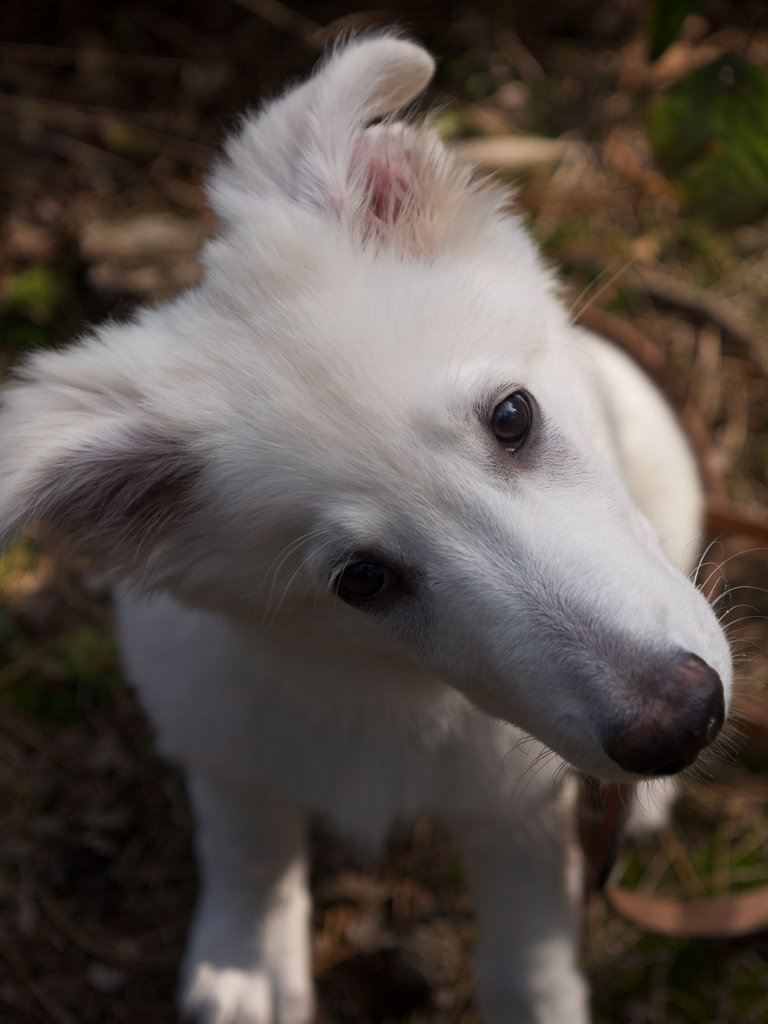
The First Mistake I Made
When I bought Rowan in 2008, the first thing I thought I would have to do was take an 'obedience course'. After all, Rowan would be a big dog, and in my mind, I needed to remain "The Boss". However, the first lesson we did together was so counterintuitive that I thought this could never be a good way to create a bond with your dog. In the first lesson, we had to let all the puppies play together. That felt good. But if your puppy walked towards you, you had to walk away from him without giving him any attention. That didn't feel good! How do you build a bond when the first lesson you give your puppy is that you are not there for him when he comes to you for support or some attention? However, at such a moment you assume that the trainer will know better than you, so I continued with the course. However, after the third lesson, where my feelings were tested more and more often, we reached a low point. During a walk that week, Rowan had a very frightening experience with another dog. Rowan as a little puppy was attacked by an older dog. I could not have prevented this attack, but fortunately, I could prevent blood from spilling. However, this caused Rowan, (who was then in his socialization period at 12 weeks), to display a behavior where he would bark at other dogs from a distance and show that he did not want them to come closer. To 'solve' this problem, the trainer based himself on dominance theory. I won't tell you the details, but the bottom line was that I had to show Rowan that I was THE BOSS, and in a way that was so counterintuitive that I couldn't even do it. At that moment I decided that this was not the trainer we needed. I was still thinking along the lines of "I want Rowan to obey me, but I want to be a good owner." I hadn't progressed to the point where I was thinking along the lines of "Communicating with your dog."
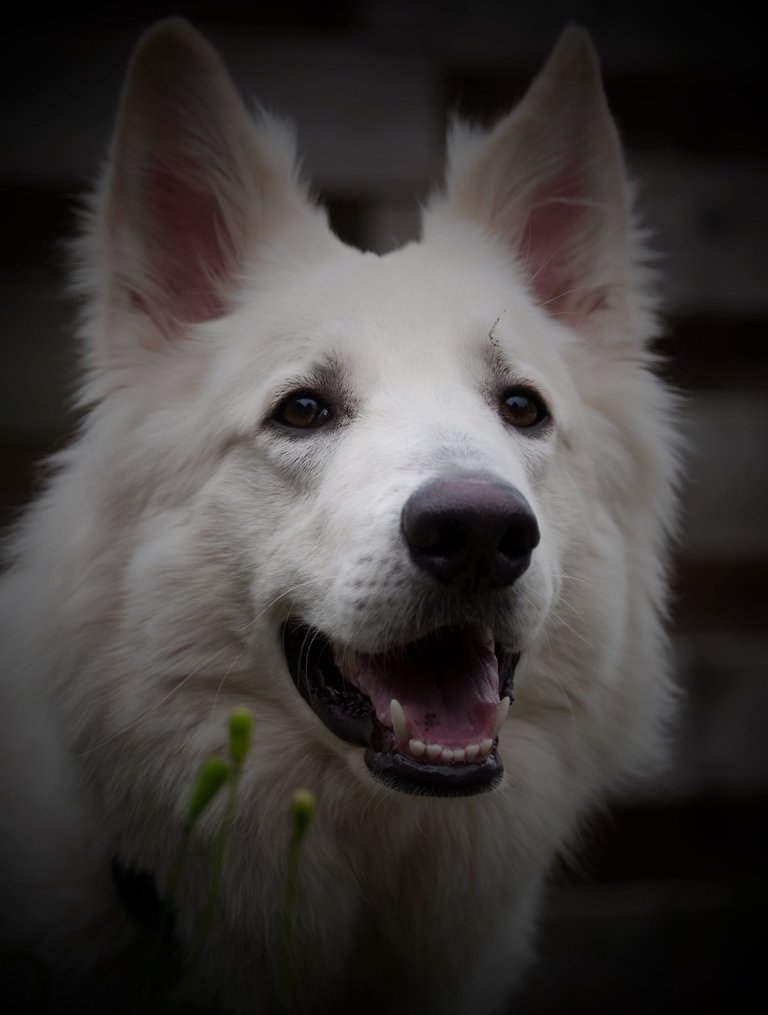
Second Attempt For A Course
The next course we attended together went slightly better, this trainer took the dog into account. I liked that. But it certainly wasn't completely great yet. Rowan had suffered from some problems as a result of these unpleasant experiences, and due to an unpleasant experience in which he had also been attacked a few times by other dogs while playing, Rowan had come to think that it would be better for him to deal the first blow himself. Dog language was also not examined in this course. Here too, the principle that you must correct wrong behavior was based on, but no steps were taken to prevent it. After looking at this for a while, I decided that I did not feel at home here, and so Rowan and I left this second course again. Now I felt like I was done with taking the course. It didn't suit us. I didn't want to raise Rowan that way anymore. Rowan was now 1 year old, and apart from the fact that he was reactive to strange dogs due to the unpleasant experiences, I had no problems with him at all. He was a great listener. He would never run away from me, and he was good to me just the way he was. I could live with that one little problem he seemed to have. After all, he seemed to want for nothing when he wasn't playing with other dogs. Who also decides that a dog always has to be like every other dog? We, humans, cannot get along with everyone. I assumed this was the same for dogs.
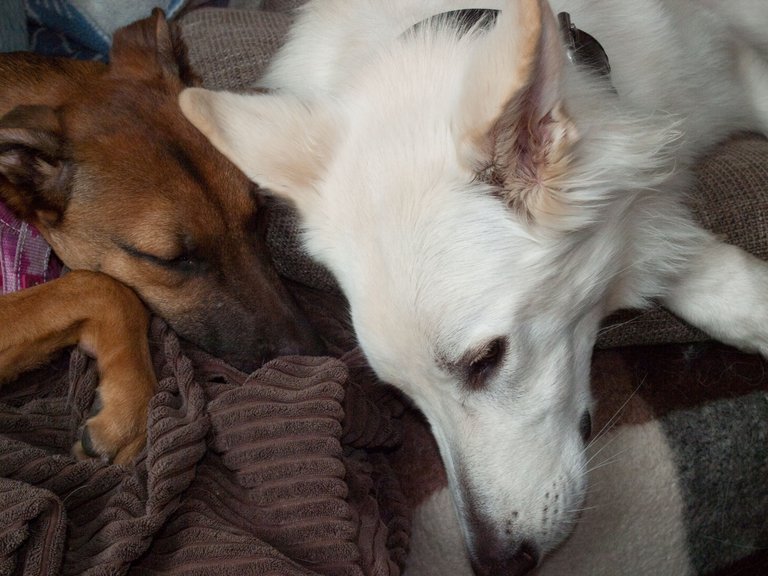
Myla Joined Rowan And Me
Then came the moment when, due to circumstances, I took over Myla, and she was a different dog than Rowan. With her, I had the feeling that I needed a course to be able to deal with her well. While Rowan was a fairly easy-going dog who only paid attention to me when we went for walks, Myla was an energy bomb who bounced around everywhere. Her energy was inexhaustible and her ears were on that little head for decoration. She pulled like crazy when we went for walks and many times I came home after a walk with blisters on my hands. So what now? So I started looking for a course again, and that's how I ended up with a dog trainer who also treated behavioral problems. But the big difference that made me want to give him a chance was that he worked with Positive Reinforcement. In short, this meant that the positive behavior shown by the dog is rewarded, and negative behavior is ignored. That was quite a change for me. But exactly what I was looking for! After all, it is much nicer to reward your dog and not have to punish him all the time. And even more importantly, dog language was DUE looked at here, and by teaching this to the students, we worked towards teaching owners to understand what a dog shows BEFORE the problems arise. Finally, I was in my place in a course and I was actively taught how to prevent problems. Myla had no social problems, it was important for her that she learned the basics and that I could direct her so that she could safely release her energy. And because this trainer knew so well what he was doing, and could convey it so well, I also decided to put Rowan in a course again. In this way, Rowan was able to learn some social behavior again, which had gone completely wrong during his puppy course. In this way, I could learn to understand what Rowan could and could not do when it came to dealing with strange dogs to avoid the problem of dropping out.
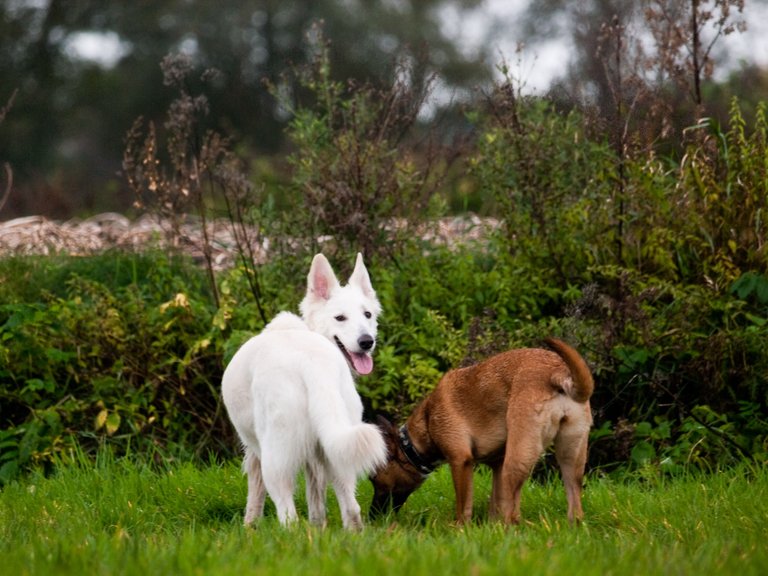
Finally, We Found The Right Trainer
I now went to classes 2 evenings a week. One evening with Myla, the other evening with Rowan. And of course, I was busy at home with two dogs. The course not only included a large part of observing your dog but also basic/advanced obedience training. Only then it is based on rewarding instead of correcting. Eliciting positive behavior and ignoring negative behavior.
To give an example:
During puppy class I had to teach Rowan the command "Sit" by giving the command and then pushing his butt down with my hand until he sat. For "Lay down" I had to give that command, and then push down just behind his shoulder blades until he lay down. If that didn't work you had to grab his front legs and by bringing them forward he also lay down.
I don't have to explain that this is NOT a nice way to teach a dog a command. And that this doesn't work well either.
The new course was based on the behavior you want to see elicited, and when the dog shows the behavior you want, you link the command to it with a treat for the dog as a reward.
This new way meant that to teach your dog to sit on command, you take a treat in your hand hold it up close to your own body in front of the dog, and show it to the dog. Almost any dog will sit on its butt and look up at what you have in your hand. The moment the dog sits down, say "Sit" and immediately reward him with a treat and a game. Dogs love to play together! Since dogs link words to behavior, positive reinforcement makes the dog want to show this behavior more often. Remember that dogs want to avoid conflict, and will do anything to avoid that conflict with you. If you are happy, they will be happy too and they will repeat the behavior because that behavior made you happy. You should also repeat such an exercise a few hundred times with your dog because dogs learn not only through positive reinforcement but mainly through repetition! Positive reinforcement is necessary to ensure that the dog repeats the behavior you want to see, and through the repetition, the dog learns that this behavior is good.
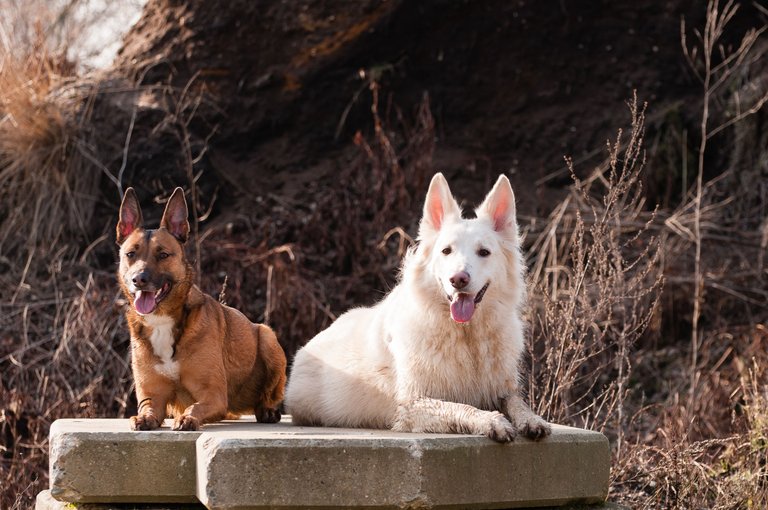
Learning To Understand Each Other
Myla passed her basic course with flying colors and Rowan didn't even need a basic course because he already knew it all, he was allowed to go straight to advanced obedience, but it was especially important for him to train his social skills. We received good guidance on this. The end of this advanced course was an exam, and for this exam, we visited a city center in our area where we walked around the center with our dogs. Obstacles in the city were used to do exercises and the trainers kept an eye on everything. I had done something right with Rowan, and this new way of training had certainly created an even better bond between Rowan and me. It was wonderful not to correct him, but to reward him a lot and often. Rowan passed his advanced obedience with flying colors.
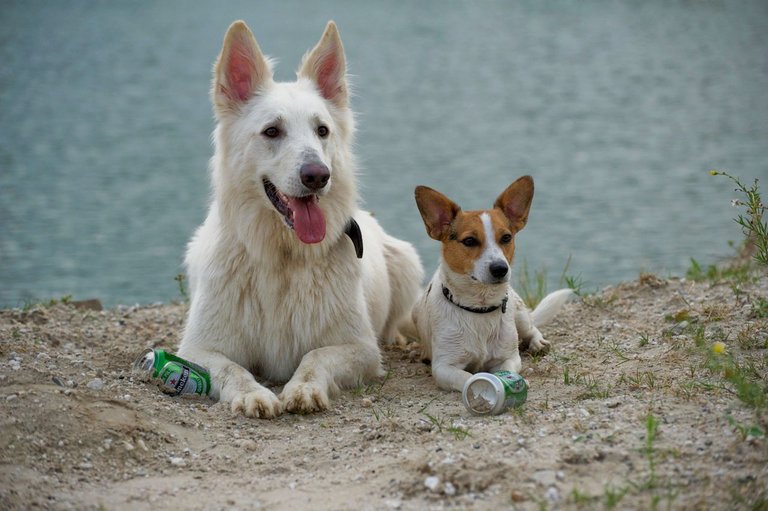
Rowan Learned Social Skills
Of course, for safety reasons, a dog must listen. But, much more important to me was Rowan had become much more social again, that he no longer lunged at every strange dog he saw from a great distance. He trusted me again because understanding his dog language allowed me to take the right action. I could support him when he needed it, I could distract him when he needed it. I understood his language! Because I had learned how I could now see from the dogs what they were communicating to each other and me. This was completely unknown to me before I took this course. Of course, I was happy that both my dogs had basic obedience, Rowan even advanced, but I thought it was much more important that I now understood much more of the dog language. And it was precisely because of that part that our bond had become so much better. And my dogs started to listen to me so much better.
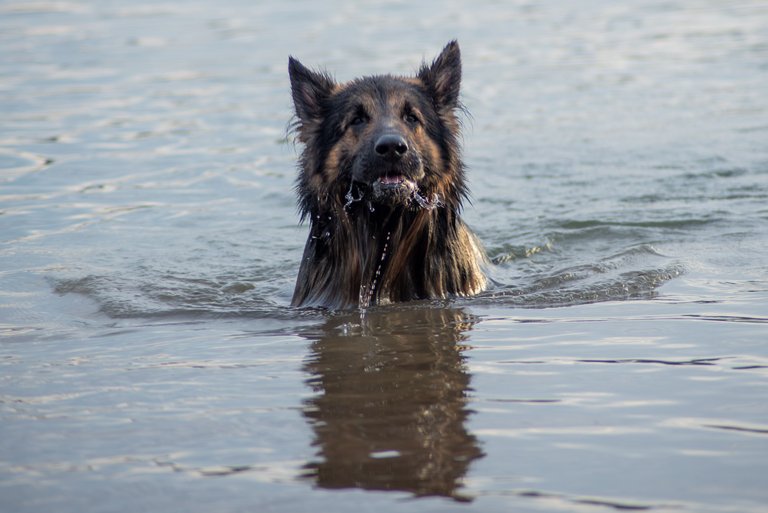
Continuous Search For The Best
Now that I have learned how dogs communicate, will everything come easy? Uh no, unfortunately not. Every dog is different, and every dog has its character. It remains a continuous search for the best way to solve problem behavior. And sometimes you can't figure it out, but the best you can achieve is that you'll be happy if you can prevent it. The dog we still have, Skipper, is an absolute sweetheart to us. At five years old, he still sometimes seems like a clumsy puppy. But he is a dog with a big backpack full of behavioral problems. Even though I know how to see what he is communicating, and even though I know how to elicit positive behavior from him, I cannot give back to him what he has not learned in his puppy imprinting phase. What I can give him is more self-confidence and respect for his character. The certainty that he is not alone and a lot of love. The knowledge that he is appreciated for who he is and that so far takes us a step further every day than we were the day before.
que hermosura, Dios lo cuide!
What a beauty, God take care of him!
¡Gracias! Supongo que tanto Rowan como Myla están protegidos por Dios. Ambos están fallecidos. Por suerte todavía nos queda Skipper, otro perro muy guapo.
Thank you! I do assume that Rowan and Myla are both protected by God. They are both deceased. Luckily we still have Skipper, another very handsome dog.
Wonderful story, I love how Rowan was able to socialize.
Oh siento que al ver las lecciones del curso, fallo en todo los puntos. Es que al tener animales que me han durado poco, siento que quiero disfrutarlos los más que pueda, más cuando he adoptado unos ya bastantes adultos. Ahorita tengo un cachorro y estoy intentando que deje de morder y se me ha dificultado, no es porque no hago lo que me dice que haga, sino que el niño es más respondón y tiene un carácter. 🤣
Oh I feel that when I see the lessons of the course, I fail in all the points. It's just that having animals that have lasted me a short time, I feel I want to enjoy them as much as I can, more so when I have adopted ones that are already quite adult. Right now I have a puppy and I'm trying to get him to stop biting and I've had a hard time, it's not because I don't do what he tells me to do, it's just that the boy is more responsive and has a temper. 🤣
You dog became a cutie to me!!! What a beautiful little baby!!! 😌